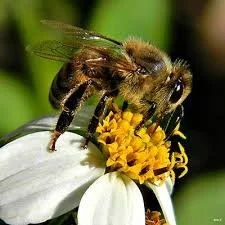The Essential Role of Pollination in Bee Life.
Pollination is a critical process in the natural world, underpinning the reproduction of many plants. While it is commonly recognized for its role in food production and maintaining biodiversity, pollination holds a special significance for bees. These industrious insects are not just pollinators but also depend on the act of pollination for their survival and well-being. This article explores the intricate relationship between pollination and bees, highlighting why this process is vital for their health, colony sustainability, economic importance, and the broader environment.
Understanding Pollination
Pollination is the transfer of pollen from the male part of a flower (the anther) to the female part (the stigma). This process can occur through various means, including wind, water, and animals, with bees being among the most effective pollinators. As bees forage for nectar and pollen, they inadvertently carry pollen from one flower to another, facilitating plant reproduction. This mutualistic relationship benefits both parties: plants achieve fertilization, leading to fruit and seed production, while bees gather essential resources for their hive.
The Role of Bees in Pollination
Bee Life
Bees play a pivotal role in the pollination of many plants, particularly those that produce fruits, vegetables, and nuts. There are over 20,000 species of bees, with honeybees, bumblebees, and solitary bees being the most prominent in pollination activities. Honeybees, in particular, are highly efficient due to their social structure and foraging behavior. They can visit thousands of flowers in a single day, ensuring widespread pollination. This activity not only supports plant diversity but also ensures the availability of food crops, which humans and other animals rely on.
How Pollination Affects Bee Health
Pollination is not merely a task bees perform; it is essential for their health. During foraging, bees collect nectar and pollen, which serve as their primary food sources. Nectar provides energy through sugars, while pollen supplies proteins, lipids, vitamins, and minerals crucial for their growth and development. Pollination of various plants provides bees with a diverse diet, ensuring they receive balanced nutrition essential for their immune system, reproductive success, and overall vitality.
Pollination and Bee Colony Sustainability
The sustainability of bee colonies is directly linked to their pollination activities. Strong, healthy colonies depend on the availability of diverse and abundant floral resources. When bees have access to a variety of flowers, they can store sufficient pollen and nectar to support the colony, especially during winter months when foraging is not possible. Additionally, effective pollination ensures the production of new queens and drones, which are necessary for colony reproduction and genetic diversity. Without adequate pollination, colonies may suffer from malnutrition, reduced reproductive rates, and increased susceptibility to diseases and parasites.
Economic Importance of Pollination to Bees
Bee
The economic value of pollination extends beyond the direct benefits to plants and human agriculture; it is also significant for beekeeping. Beekeepers rely on healthy, productive hives to harvest honey, beeswax, royal jelly, and other bee products. Bees contribute billions of dollars to the global economy annually through their pollination services. Furthermore, many commercial crops, such as almonds, apples, and blueberries, depend heavily on bee pollination. Beekeepers often rent out their hives to farmers during the blooming season, creating a symbiotic relationship that underscores the economic importance of pollination.
Environmental Impact of Pollination on Bee Populations
The environmental impact of pollination on bee populations is profound. Healthy ecosystems with diverse plant species offer bees a variety of foraging options, promoting robust bee populations. Pollination helps maintain plant biodiversity, which in turn supports a range of wildlife, including bees. Conversely, habitat loss, pesticide use, and climate change can disrupt pollination patterns, leading to declines in bee populations. Protecting natural habitats and fostering environments where diverse plant species can thrive are essential steps in supporting bee health and the broader ecosystem.
Challenges Faced by Bees in Pollination
Despite their critical role, bees face numerous challenges that threaten their ability to pollinate effectively. Habitat destruction, monoculture farming, pesticide exposure, and climate change are major threats. These factors can reduce the availability of diverse floral resources, expose bees to harmful chemicals, and alter blooming periods, disrupting the synchrony between bees and flowers. Additionally, diseases and parasites, such as the Varroa mite, can weaken colonies, making them less efficient pollinators. Addressing these challenges requires concerted efforts from farmers, policymakers, scientists, and the public to create bee-friendly environments and sustainable agricultural practices.
Conservation Efforts to Support Bee Pollination
Bee
Conservation efforts aimed at supporting bee pollination are crucial for ensuring the survival and prosperity of bee populations. Initiatives include planting pollinator-friendly gardens, reducing pesticide use, protecting natural habitats, and promoting organic farming practices. Governments and organizations worldwide are also implementing policies and programs to safeguard bees. Educating the public about the importance of bees and encouraging citizen science projects can further enhance conservation efforts. By creating supportive environments and raising awareness, these measures help sustain healthy bee populations and, consequently, effective pollination.
Conclusion
Pollination is an indispensable process for both plants and bees. For bees, it provides essential nutrients, supports colony sustainability, and has significant economic and environmental impacts. However, the challenges bees face in performing their pollination duties highlight the need for robust conservation efforts. Understanding and supporting the intricate relationship between bees and pollination is vital for preserving biodiversity, ensuring food security, and maintaining healthy ecosystems. By prioritizing the protection of bees and their habitats, society can foster a thriving natural world where both bees and humans can flourish.
Pollination is important in bee life.



